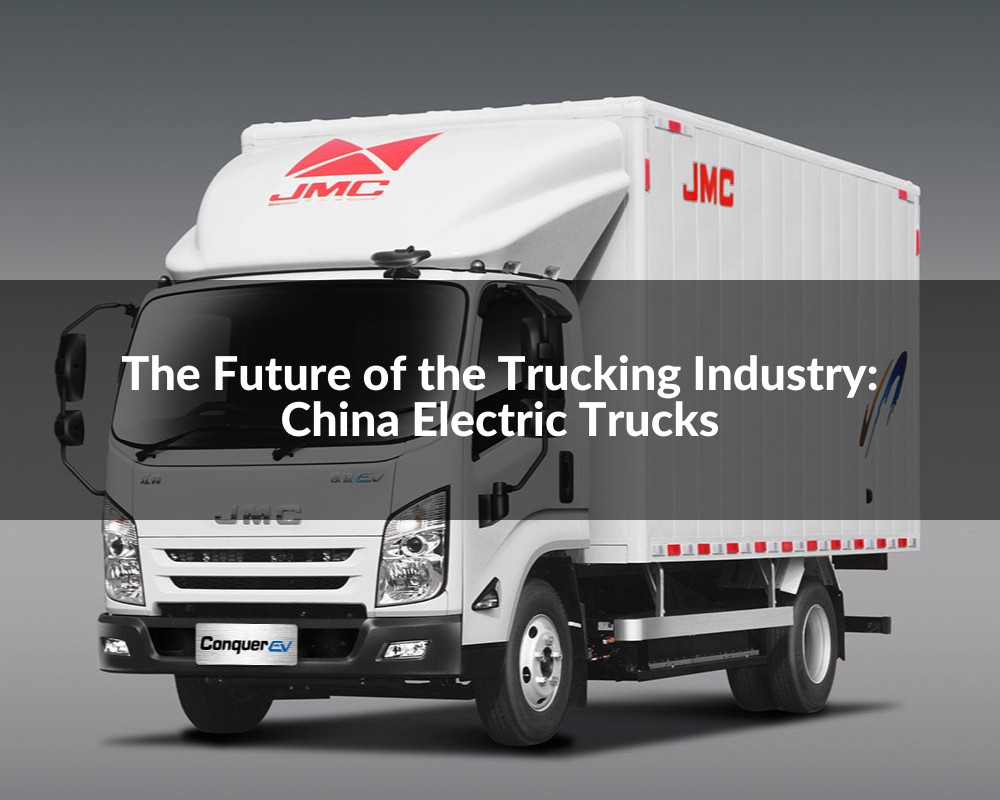The Future of the Trucking Industry: China Electric Trucks
- Categories:NEWS&EVENTS
- Author:
- Time of issue:2023-12-28 11:54
- Views:0
(Summary description)Explore the transformative world of China's electric trucks and the global impact of this revolutionary shift. Dive into the advancements, challenges, and benefits of electric semi trucks, with insights into leading manufacturers like JMC.
The Future of the Trucking Industry: China Electric Trucks
(Summary description)Explore the transformative world of China's electric trucks and the global impact of this revolutionary shift. Dive into the advancements, challenges, and benefits of electric semi trucks, with insights into leading manufacturers like JMC.
- Categories:NEWS&EVENTS
- Author:
- Time of issue:2023-12-28 11:54
- Views:0

The trucking industry is on the cusp of a revolutionary change, led by the rapid advancement and adoption of electric vehicles (EVs). At the heart of this transformation is China, a country pioneering in the realm of electric trucks and electric semi trucks. This article delves into how China's electric truck industry is shaping not only its domestic landscape but also casting a profound influence on global markets and environmental practices. Join us as we explore the current state, advancements, challenges, and the far-reaching impacts of electric trucks, highlighting China's role in this pivotal shift.
- The Current State of Trucking in China
- The Advent of Electric Trucks in China
- The Impact and Benefits
- Challenges and Solutions
- Global Implications
Part 1: The Current State of Trucking in China
1. Overview of the Trucking Industry in China
China's trucking industry, a critical component of its economic framework, has experienced remarkable growth over the past decades. With a vast network that connects urban and rural areas, it plays a pivotal role in the nation's logistics and supply chain. However, as the world gravitates towards sustainability, this sector faces the challenge of aligning with global environmental standards, especially in the context of China's commitment to reducing carbon emissions.
2. Present Day Scenario: The Role of Traditional Diesel Trucks
Traditional diesel trucks have long been the backbone of Chinese freight transport, prized for their reliability and strength. Yet, their environmental and economic impacts are becoming increasingly evident. The high emissions from diesel trucks contribute significantly to air pollution, a major concern in many Chinese cities. Additionally, the fluctuating costs of diesel fuel pose a constant challenge for transport companies, affecting the overall efficiency of logistics operations.
Environmental and Economic Challenges
The environmental challenges posed by diesel trucks are multifaceted. They contribute to air pollution and have a noticeable impact on climate change due to their carbon emissions. Economically, the reliance on diesel fuel subjects the trucking industry to global oil price volatility, affecting operational costs and stability. These factors have spurred the need for a transition to more sustainable alternatives like electric trucks, particularly in urban areas where pollution and noise are key concerns.
3. Government Policies and Regulations
The Chinese government has been proactive in shaping the future of the trucking industry through various policies and regulations. Recognizing the potential of electric vehicles (EVs) in revolutionizing the transport sector, there have been significant incentives for the development and adoption of electric trucks. These incentives include subsidies, tax exemptions, and support for EV infrastructure development.
Incentives for Electric Vehicles
In a bid to encourage the shift to electric vehicles, the Chinese government has implemented a range of incentives. These include direct subsidies for the purchase of EVs, reductions in registration and license fees, and investments in charging infrastructure. Such measures aim to reduce the total cost of ownership for electric trucks, making them a more viable option for businesses.
Regulations Impacting Diesel Trucks
Concurrently, the government has introduced stricter regulations on diesel trucks, particularly regarding emissions. These regulations aim to curb pollution by enforcing emission standards and encouraging the phasing out of older, more polluting diesel vehicles. This regulatory environment is gradually steering the trucking industry towards cleaner and more sustainable practices.
Part 2: The Advent of Electric Trucks in China
4. Emergence of Electric Trucks
The emergence of electric trucks in China marks a significant shift in the trucking industry, driven by a global trend towards sustainability and clean energy. These electric trucks, varying from light-duty to heavy-duty models, are increasingly visible on China’s roads, signaling a transformative phase in freight and logistics. This shift is not just a technological leap but also a response to the growing environmental concerns and the need for more efficient and cost-effective transportation solutions. The Chinese government's ambitious goals for reducing carbon emissions and improving urban air quality have acted as catalysts in accelerating the adoption of electric trucks. Manufacturers, both domestic and international, are responding to this demand with a range of innovative models designed to meet the diverse needs of the transport sector.
5. Technological Innovations
Technological advancements are at the heart of the rise of electric trucks in China. These innovations are not limited to the vehicles themselves but encompass a broader ecosystem, including battery technology, charging infrastructure, and vehicle-to-grid systems.
Battery Technology and Range
Recent breakthroughs in battery technology have been instrumental in enhancing the range and efficiency of electric trucks. The development of high-capacity, lightweight batteries with faster charging times has addressed one of the main concerns of the trucking industry – range anxiety. Innovations in battery chemistry, such as solid-state batteries, are poised to offer even greater energy densities and safety features. These technological advancements are crucial in making electric trucks a viable alternative for long-distance transportation, significantly closing the gap with their diesel counterparts in terms of operational range and performance.
Charging Infrastructure
The expansion of charging infrastructure is a critical component of the electric truck ecosystem. China is leading the way in developing a comprehensive network of charging stations, designed to support the specific needs of electric trucks. This includes high-capacity, fast-charging stations strategically located along major freight routes, as well as in urban and industrial areas. Efforts are also underway to integrate smart charging technologies that optimize charging times and energy use, further enhancing the efficiency and convenience of using electric trucks for business operations.
6. Economic Viability
The economic viability of electric trucks is a crucial factor in their growing popularity in China. As technology advances and production scales up, the cost of electric trucks is becoming more competitive, offering a viable economic alternative to diesel trucks. This shift is not only driven by environmental concerns but also by the tangible economic benefits that electric trucks offer to businesses.
Cost Analysis Compared to Diesel Trucks
When comparing electric trucks to their diesel counterparts, the total cost of ownership paints a compelling picture. The initial purchase price of electric trucks is often higher, but this is offset by lower operational costs over time. Electric trucks have significantly lower fuel costs, as electricity is cheaper than diesel. Additionally, electric trucks benefit from reduced maintenance requirements due to fewer moving parts and less wear and tear. Over the lifespan of the vehicle, these factors can result in substantial cost savings, making electric trucks an economically attractive option for many businesses.
Government Subsidies and Support
The Chinese government's support plays a pivotal role in enhancing the economic viability of electric trucks. Substantial subsidies and financial incentives are offered to offset the higher initial costs and promote the adoption of electric vehicles. These incentives include reduced purchase taxes, exemptions from certain fees, and direct subsidies for both vehicle purchase and charging infrastructure development. Furthermore, the government's investment in research and development spurs continuous innovation, further reducing the costs and improving the efficiency of electric trucks.
Part 3: The Impact and Benefits
7. Environmental Impact
The transition to electric trucks in China is having a profound impact on the environment. This change is pivotal in the country's efforts to combat climate change and improve air quality in urban and industrial areas.
Reduction in Emissions
Electric trucks play a significant role in reducing greenhouse gas emissions, particularly carbon dioxide and nitrogen oxides, which are prevalent in exhaust from diesel engines. By shifting to electrically powered vehicles, the trucking industry can dramatically cut its carbon footprint. This reduction is even more substantial when the electricity used for charging comes from renewable sources, further amplifying the environmental benefits.
Sustainability Benefits
Beyond reducing emissions, electric trucks contribute to broader sustainability goals. They help decrease dependence on fossil fuels and promote the use of renewable energy sources. This shift not only benefits the environment but also ensures long-term energy security and sustainability, aligning with global efforts to transition to a more sustainable and resilient energy economy.
8. Economic Impact
The economic impact of adopting electric trucks is significant, with far-reaching implications for businesses, the labor market, and the broader economy.
Potential Savings for Businesses
For businesses, the switch to electric trucks can lead to substantial savings. Lower operational costs, including reduced fuel and maintenance expenses, directly impact the bottom line. Additionally, the growing efficiency and reliability of electric trucks are making them increasingly competitive with traditional diesel trucks, offering long-term financial benefits and improved operational efficiency.
Job Creation and Market Growth
The electric truck industry is also a catalyst for job creation and market growth. The development, manufacturing, and maintenance of electric trucks and their infrastructure create new jobs and opportunities for skill development. This burgeoning sector is attracting investments and driving innovation, contributing to the growth of the green economy and reinforcing China's position as a leader in electric vehicle technology.
9. Social Impact
The shift towards electric trucks has significant social implications, especially in terms of public health and perception.
Health Benefits from Reduced Pollution
One of the most immediate social benefits of electric trucks is the improvement in air quality, leading to better public health outcomes. Reduced emissions from electric trucks mean fewer pollutants in the air, which can substantially lower the incidence of respiratory diseases and other health issues associated with air pollution. This improvement in air quality has a direct and positive impact on the quality of life for millions of people, particularly in urban areas.
Public Perception and Acceptance
The adoption of electric trucks also influences public perception and acceptance of electric vehicles in general. As people witness the practicality and benefits of electric trucks, it fosters a positive attitude towards EVs, encouraging wider acceptance and adoption. This shift in public perception is crucial for the long-term success of the electric vehicle industry and for achieving broader environmental and sustainability goals.
Part 4: Challenges and Solutions
10. Technological Challenges
Despite the advancements, the electric truck industry faces several technological challenges that need to be addressed to ensure its long-term success.
Battery Life and Efficiency
One of the primary technological challenges is improving battery life and efficiency. Current battery technology, while advanced, still has limitations in terms of energy density, weight, and degradation over time. To overcome these issues, ongoing research and development are crucial. Innovations in battery materials and design can lead to more efficient, lighter, and longer-lasting batteries, which are essential for the widespread adoption of electric trucks, particularly for long-haul transportation.
Charging Infrastructure Limitations
The current charging infrastructure, although rapidly expanding, still presents challenges in terms of availability, speed, and distribution. Addressing these limitations requires a coordinated effort between government bodies, industry players, and technology providers. Expanding the network of charging stations, especially in remote and rural areas, and enhancing the charging speed with new technologies are key steps in resolving these challenges.
11. Economic Challenges
The economic landscape for electric trucks also poses several challenges that need to be navigated.
Initial Investment Costs
The high initial investment costs for electric trucks and charging infrastructure are significant barriers for many businesses. To mitigate this, financial incentives such as subsidies, tax breaks, and low-interest loans can be more widely offered by the government and financial institutions. Additionally, innovative business models like leasing or pay-per-use can make the transition more financially feasible for small and medium-sized enterprises.
Market Uncertainty
Market uncertainty, driven by evolving technologies and fluctuating policy landscapes, can deter investment in electric trucks. To address this, clear and consistent communication from government and industry leaders about the future direction and incentives for electric vehicles can instill confidence in businesses and investors. Creating a predictable market environment is essential to attract long-term investments and foster industry growth.
12. Policy and Regulatory Challenges
Policy and regulatory frameworks play a critical role in shaping the future of the electric truck industry.
Consistency in Regulations
A major challenge in this area is ensuring consistency in regulations. Disparate and frequently changing regulations can create confusion and hinder progress. Harmonizing regulations at both national and local levels, and ensuring they align with international standards, can facilitate smoother adoption and operation of electric trucks. This also includes standardized protocols for charging infrastructure and battery safety.
International Trade Implications
The international trade implications of shifting to electric trucks are also significant. Policies need to be developed that consider the global supply chain, especially concerning the sourcing of battery materials and the export of technology and vehicles. Collaborative international agreements and trade policies can support the global development of the electric truck industry, benefiting both China and its trade partners.
Part 5: Global Implications
13. China's Position in the Global Market
China's rapidly growing electric truck industry is not only reshaping its domestic transport landscape but also positioning the country as a key player in the global market.
Competitiveness and Influence
As a leader in electric vehicle technology, China is setting new standards in the electric truck market. Its competitive edge is bolstered by large-scale production capabilities, continuous innovation, and a robust supply chain. This competitive stance is not just about market dominance; it's also about influence. China's advancements are prompting global industry shifts, encouraging other countries to accelerate their own electric vehicle programs. This influence extends beyond technology to setting international standards and norms for electric vehicle manufacturing and utilization.
14. The Ripple Effect on Global Supply Chains
The rise of China's electric truck industry is having a significant ripple effect on global supply chains.
Impact on International Trade
This impact is multifaceted, influencing everything from the demand for raw materials used in batteries to the logistics of international shipping. As China scales up production, it increases the global demand for materials like lithium, cobalt, and nickel, reshaping the mining and commodities markets. Moreover, the export of Chinese electric trucks and technology is influencing trade dynamics, offering new products and partnerships in international markets. These changes are encouraging more integrated and efficient global supply chains, tailored to the needs of the electric vehicle industry.
15. Environmental Implications Globally
The environmental implications of China's shift to electric trucks resonate on a global scale.
Contribution to Global Emission Reduction Goals
China's large-scale adoption of electric trucks significantly contributes to global emission reduction efforts. As one of the world's largest greenhouse gas emitters, China's move towards electrification in transportation is critical in achieving global climate targets. This transition not only reduces emissions within China but also sets a precedent for other countries, demonstrating the feasibility and benefits of shifting to electric vehicles. Furthermore, China's advancements in electric truck technology can be leveraged by other nations, helping to accelerate global emission reduction efforts.
Leading the Electric Revolution: China's Pioneering Role
In conclusion, the journey of electric trucks in China is more than just a national endeavor; it's a global movement reshaping the future of transportation. As we look towards a more sustainable and economically viable future, it's clear that electric vehicles, particularly trucks, play a pivotal role. Leading this charge is JMC, a premier manufacturer of Electric Pickups and Electric Trucks. JMC's commitment to quality, innovation, and sustainability places it at the forefront of this industry, not just in China but globally. Explore the world of possibilities with JMC’s electric vehicles and learn more about their cutting-edge offerings at www.jmcg-global.com. Join us in embracing a cleaner, greener future powered by electric innovation.
Read More:
Scan the QR code to read on your phone
Relevant Information




MESSAGE
WRITE A MESSAGE TO US
Copyright: Jiangling Motors Corporation Group GAN ICP 17001991-1 www.300.cn
Copyright: Jiangling Motors Corporation Group






